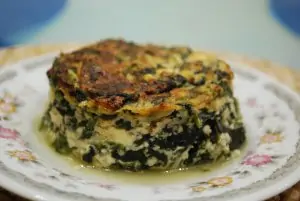I’m sure I’m not the only one who was left with a tub still nearly full of ricotta cheese after a recipe called for only a few tablespoons of it.
Like me, you may have wondered if you can freeze ricotta cheese to save for the next time you need to use it.
I will, in fact, tell you that you should freeze the cheese, and also share with you how to freeze it–and also how to thaw that same ricotta cheese for the best possible results.
Ricotta is a fresh cheese created usually from cow’s milk. It used to be made by taking left-over curds from other cheesemaking processes, like parmesan, adding an acid, and then heating it until whatever proteins are left coagulate.
Ricotta, which means “twice-cooked”, got its name from this traditional method of making it.
Nowadays, ricotta cheese is generally made by adding acid directly to fresh whole or skimmed milk. The liquid is drained away, leaving behind tiny and sandy grains. After these are compacted, they become ricotta cheese.
Should You Freeze Ricotta Cheese?
Ricotta is an expensive cheese that has a short shelf-life. This is because its curd is formed by adding an acid instead of by good bacteria, as other kinds of cheeses are made.
Ricotta cheese, therefore, becomes a rich medium for spoilage because it has no bacteria of its own to fight off the bacteria that causes spoilage.
Some cheese producers may add preservatives to add length to its shelf life, but even so, the longest time ricotta can last without other precautions is only a week in the fridge.
You can tell when your ricotta is going bad because it turns pink as it gets old, an indication that it is already a host to several food-spoiling organisms.
Freezing ricotta cheese does not alter its flavor. However, you’ll notice that the cheese will become drier and more crumbly with freezing. Due to its high moisture content, the water content of the ricotta will turn to ice in the freezer and will cause this change in the ricotta’s texture.
The next time you need ricotta for a recipe, go ahead and freeze the leftover cheese. The change in texture is not very noticeable, and the flavor is not affected at all.
How to Freeze Ricotta Cheese
The first step to properly freeze ricotta cheese is to remove the excess whey. Whey is the liquid part of the cheese: mostly water that turns into ice and can affect the delicate protein structure of the cheese. Ricotta is composed of small, high-surface-area curds that can break and easily dry out.
To remove the whey from ricotta cheese: place the ricotta in a mesh strainer and use a spoon or a stack of paper towels to press on the cheese. Let the whey drip out. Then, stir the ricotta to homogenize it before you pack it into airtight containers. You also can place the ricotta cheese first in a resealable freezer bag before packing in all into an airtight container.
Remember, though: ricotta should never be refrozen. It is best to freeze it in small quantities and thaw only the amount you immediately need.
If you find ricotta cheese on sale, remember that unopened containers of ricotta can be frozen in their original packaging.
Either way, you need to mark your containers with the date you put them in the freezer. This will remind you to use the ricotta cheese within two months. If you do not use it within two months, throw it out.

How to Thaw Ricotta Cheese
The best and safest way to thaw frozen ricotta cheese is to simply remove it from the freezer and place it in the fridge.
This method of thawing the cheese will take about five to six hours. It is not recommended to thaw it for longer than that: if you leave it in the refrigerator to thaw for more than eight hours, the ricotta’s texture may deteriorate even further.
Note: It is not a good idea to thaw ricotta at room temperature, since it puts the cheese at risk of bacterial contamination.
When the ricotta cheese has thawed completely, use a spoon to stir it..
The thawed, stirred ricotta cheese will keep for up to three more days in your fridge.
Make sure you thaw only the amount of ricotta you need: refreezing leftover ricotta cheese is impossible, since this will completely ruin its texture.
The next time you want to freeze ricotta cheese, consider freezing it in individual servings to avoid this situation.
How Can I Use Leftover Ricotta?
Having leftover ricotta cheese can actually inspire you to try a new recipe: there are so many different things you can do with it. Ricotta pancakes, homemade lasagna, ricotta cheese and spinach quiche–these are only a few ideas to get you started on how to use that frozen ricotta.
A note of warning: ricotta that has been frozen and thawed, however, must only be used as an ingredient in cooked dishes. This way, the change in texture will be less noticeable.
It is best to pair thawed ricotta cheese with emulsifiers and fatty, high moisture ingredients like cream, different cheeses, or eggs.
- Stuffed pastas
- Pizza and calzones
- Pancakes
- Baked goodies like cookies, cakes, pound cakes
- Lasagna
- Casseroles
Avoid using frozen ricotta where it is the main component in dishes like cannoli filling, or where its texture is prominent, like cheesecake.
Conclusion
Freezing ricotta cheese may be your only option if you don’t want to waste it after using only part of the tub in a recipe.
However, you do have to sacrifice the texture of ricotta. This will be worth it, though, since you usually end up having a lot more leftover ricotta cheese than you know what to do with.
Use the freezing method explained above to extend the life of your leftover ricotta cheese instead of throwing it away. To find the best success in freezing it, make sure you use a proper, air-tight container to store the cheese in the freezer. It must be airtight to prevent further deterioration of the ricotta’s texture and eventually, its taste.
Frequently Asked Questions:
Can I freeze ricotta cheese for later use?
Freezing seems to be the only choice you have to keep ricotta cheese from going bad and to make it last longer than two days.
Just accept the fact that freezing will definitely affect ricotta cheese’s texture..
Again, freeze ricotta cheese only if you plan to use it in cooked dishes. It is not advisable to use thawed ricotta in salads or cheesecake.
How long can ricotta cheese be frozen?
The longest that you can freeze ricotta cheese is two months.
It can stay in the freezer longer than that, but the flavor of the cheese will start to change as well. Over time, fat oxidation will have a negative effect on the taste. However, it is still safe to eat. Just make sure that is stored in an airtight container.
Additional Resources:
- Food.com: Our Favorite Lasagna Recipe
- SimplyRecipes.com: Lemon Blueberry Ricotta Pound Cake Recipe
Image Credits from Flickr: “Spinach and Ricotta Pudding” (CC BY-SA 2.0) by avlxyz; “Ricotta” (CC BY 2.0) by Happy Tummy






Rhonda grew up with parents who gardened, hunted, fished, canned, and preserved food. Her mother was a professional cook and Rhonda credits her teaching everything from how to make homemade biscuits and gravy to what kind of meals to serve for different occasions. In the kitchen, Rhonda uses a mix of old-fashioned country cooking and up-to-date fads in the kitchen, often experimenting with replacing higher-calorie or fat ingredients with healthier options that still retain the delicious flavors of the originals.